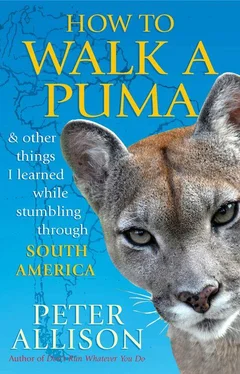The men also sport some fine hairdos. Otobo’s father-in-law, as I’ve mentioned, could have stepped straight off the cover of a Bon Jovi album (if Jon Bon Jovi were five foot tall, that is). Quempere maintains a traditional style, long, with a dead-straight fringe stopping just above his eyebrows, kept in shape by regular trims with sharpened mollusc shells. Like his father-in-law, Otobo has a fine mullet, and I saw a child in Bameno with a perfect Elvis coif.
As his wife worked, Omagewe kept me entertained with a pantomime of the morning’s hunt, during which he’d speared a peccary (a pig-like animal that travels in large herds, clacking their sharp tusks as a warning to any potential predator): all the while he chatted in Huao and laughed, chortling hardest at the part where he fell from a tree and the peccary slashed his ankle with its tusk. Part of the Huaorani’s happiness seems to stem from their ability to find comedy in everything. If I saw someone fall out of a tree my Western instinct would be to ask how they were or offer assistance. The Huaorani laugh at them until the person laughs back. Maybe they would respond differently if the situation was life-threatening, but I never witnessed such a situation.
When I returned to Boanamo, Otobo explained to me that the following day I was going to be sent off deeper into the jungle again and would spend the night near one of the salt licks; this might be my best chance of seeing a jaguar at last. Time has almost no meaning in the Amazon, so while my makeshift diary allowed me to keep track of the date I had no idea what hour or day it was, but I did know that the date of my departure from the jungle and the continent was stalking, getting closer, and about to clamp down.
On my London trip to see Lisa I had met up with several of my old safari friends who had been attending a travel trade show, and I had been offered a very intriguing job by one of them. It involved travel—lots of it—and the chance to do good. The company I’d be working for is quite fraudulent, in that it’s not really a business at all but a conservation organisation disguised as one. It runs safari camps but uses its profits to protect habitat for animals, sponsor research, and involves communities in conservation projects so they embrace them. I’d decided to take the job, and once I left the Huaorani I would be heading out of South America after almost eighteen months there. I wanted the most from the last few days. Above all, I wanted to see a jaguar.
•
The next morning I didn’t go to the salt lick as planned—to the Huaorani, plans are as flexible as time and numbers; while I had found this mildly frustrating at first, I soon found it quite liberating. Instead Omagewe took me for a jungle walk. There is a rhythm to jungle walking. It is less frantic than a city walker’s pace, less harried, but it somehow feels faster, more elegant, a glide compared with a thump. A jungle walker’s feet must be in tune with their eyes, the same eyes that watch the canopy, the trees, for prey or danger while picking out the quietest and most efficient way of placing each limb. This requires the most intense concentration but is somehow relaxing, like a mobile meditation. Both exhilarating and soothing, it may be our species’ oldest and finest art.
I’m crap at it.
Twigs snapped under my feet, branches rustled as my arms brushed against them, and the permanent toothy display of joy I couldn’t hide would have been as subtle as Gotham City’s bat signal. ‘Look! Over there! Hop in the monkey-mobile! It’s an idiot!’ I could imagine my quarry saying.
Making things worse, I was wearing boots, no doubt a fetching complement to my string, but necessary as my baby-soft feet had me hopping, cursing and stumbling in blind pain whenever I tried walking without them—surely a spearable offence should I chase food away.
For Omagewe the jungle was a book he had read so often that every page was familiar. In Africa I might have advanced to Dr Seuss levels of proficiency; here I didn’t even know the alphabet. But as always, Omagewe read his book as a comedy, and regaled me with long incomprehensible tales in Huao peppered with some Spanish words he had just learnt, chuckling as he acted out previous hunts, mainly of peccaries (though for all I knew he might have slipped in a tale or two about picking off oil workers as well).
People I knew who had visited the Huaorani had told me about witnessing the moment when they get ‘in the zone’, becoming pure hunters. This happened while I was out with Omagewe. He carried just a spear, no blow gun with poison darts, so he could only hunt ground game, but while he was pointing out some woolly monkeys to me they reacted as if he were fully equipped to put a dart in them and took off through the canopy in fright. If he had been hunting and had managed to hit one with a poison-tipped palm arrow he would have had to chase it, as the monkeys don’t die immediately. So when these monkeys swung away he shot off along the ground below them, perhaps out of habit, perhaps just for the fun of it; all of a sudden his four-foot-ten frame was an immense advantage. On a level track I am confident of my speed, but here he was swift, silent and agile. I lumbered behind him in my flippety-flappety rubber boots, feeling like a half paralysed elephant seal.
At one stage, while he was still in sight, I saw ahead of him a fallen tree about a foot off the ground; another tree had been brought down and lay parallel above it, leaving a gap of maybe two feet, with lianas framing it on either side. Without breaking stride or losing sight of the monkeys, Omagewe ran straight ahead, jumping at the gap, tucking his legs under and his head down, a mighty ball of muscle with a spear protruding, before starbursting on the other side of the gap and hitting the ground without missing a step. Following him, I ran up to the obstacle, briefly paused, and then made the uncharacteristically sensible decision to run around it. By then, however, Omagewe was out of sight.
Some minutes later he came back, grinning sheepishly, spear still in hand, telling me with gestures and Huao what had just happened, even though I had witnessed most of it. Then he told me again, this time with some monkey noises thrown in. He smiled at me, seeming to want a response.
‘ Waponi ,’ I said and, as expected, he laughed as if it was the best thing he’d ever heard.
Alone in the Amazon

I was completely alone. In the Amazon. Well, alone as far as human company went. At least eight species of parrot, including three types of macaw, were squawking, cackling, chirping and croaking around me, and I’d been visited by howler monkeys, spider monkeys, and a very large herd of white-lipped peccaries. Due to the peccaries’ reputation for aggression I thought it best to entertain them from a perch a little way up a tree, and spent more than an hour there, during which I realised that I had spent more time in trees as an adult than I ever had as a boy, and reflected that this was probably a fine thing.
I had arrived at the salt lick a couple of days later than planned and would stay there for two nights and three days. I had asked to go alone so I could get a real feel for the jungle; I also wanted to give Otobo’s family a break from me. With me, I had a small tent, plenty of water, my binoculars, some chocolate that Otobo had miraculously produced, two torches, a spear on loan from Omagewe, and an imagination that just wouldn’t stop taunting me with everything that could go wrong. It was exciting, but also very frightening, so to soothe myself I started a list of things that could kill me while I was staying alone at the salt lick, reproduced here:
Читать дальше













